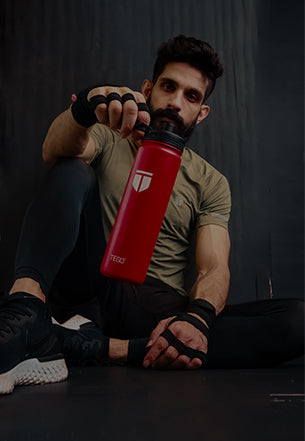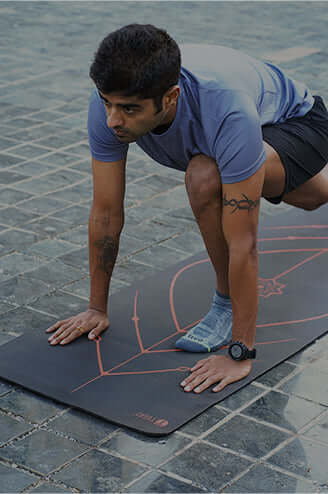"If you've promised yourself something, are you living up to it? That, to my mind, is the first step of being Tagda. If you live up to your own expectations and promises, nothing else matters." - Rishabh Malhotra, Founder, Tagda Raho
At TEGO, we define an Everyday Athlete as someone who shows up with discipline, adapts to challenge, and moves with purpose not just in training, but in life. Rishabh Malhotra embodies that definition completely. From regaining the use of his arm with a custom-made gada to reintroducing Indian strength traditions for modern practitioners, his journey is a lesson in persistence and ingenuity.
The Turning Point
During an ultra-endurance cycling expedition from Kashmir to Kanyakumari, Rishabh developed brachial neuritis, a condition that left his left arm with only 25% mobility. For months, even basic movement required lifting the arm with his good hand. Standard therapies helped to a point, but recovery stalled.
His mind kept circling back to the weight distribution principles of ancient Indian training tools like the gada: heavy on one side, working through a lever principle, engaging the body as a single unit. This wasn't a random insight. Rishabh had formal training in strength and conditioning, which gave him the technical knowledge to understand biomechanics and weight distribution principles. His background helped him make the connection between his condition and the lever principles of traditional Indian equipment.
The solution? He couldn't find the right gada anywhere. "In my own country, my own format of training, I couldn't get the equipment." So he had one made. Using it with his good hand and involving the injured arm as support, he built a training format for himself. Four months later, his strength and mobility had returned. "That was my moment. If this could bring my arm back, what else could it do for others?"
Reviving something that's been around for centuries comes with challenges. "The challenge wasn't proving that traditional Indian training works - it was breaking the stereotype that it's only for pehalwans in village akhadas," Rishabh explains. Convincing an IT professional or a desk-bound executive that swinging a gada or mudgar is relevant to them takes more than nostalgia. It takes results. And the results are there: today, Tagda Raho trains the Indian Army Special Forces, works with IPL and Pro Kabaddi League teams, and has hosted international athletes like Jonty Rhodes.
Breaking the Mould
For Rishabh, calling these methods "ancient" misses the point. "People think that just because this is ancient, it might not be effective. No - this is timeless. It's been around for centuries because it works." The core principles (full-body integration, lever-based resistance, rhythmic movement patterns) align perfectly with modern biomechanics and longevity science. And they've always had structure: "Everything had microhabits and rituals built in - not because of superstition, but because they realised these habits help you live longer."
In their original form, gadas and mudgars came in fixed weights. Beautiful for the akhara, but impractical for an urban lifestyle. Rishabh redesigned them with adjustable weights and interchangeable grips so a single tool could serve multiple users and goals. His training spaces bring natural elements like sand pits, open air, and wood into accessible city locations. "We asked ourselves: if yoga evolved to reach 150 countries, why hasn't our strength training evolved? Not just internationally, but within our own cities?"
The answer lay in making tools and training relevant to modern urban life: compact, adaptable, and engaging for bodies shaped by desk jobs and long commutes.
The Foundation of Strength
Rishabh grew up in an army family where fitness wasn't a lifestyle choice but was the default. "You'd wake to a bugle at 5 AM. On the way to school, you'd see soldiers running with battle loads or climbing ropes. That level of readiness was everyday life." It's here he absorbed the ethos summed up in an army phrase: ‘mushkil waqt, commando sakt’. When the going gets tough, the tough get going. That same readiness defines how he approaches training today.
Having experienced both the extreme demands of ultra-endurance cycling and the patience required for injury rehab, Rishabh's training philosophy is simple: "Nothing matters more than consistency." He prefers volume over complexity: three or four movements, done with intent for 90 minutes or more. But he's learned to balance discipline with awareness. "I've been on the other side, making it all about discipline and ignoring signals. I've learned my lesson - now I listen to my body."
Ask him what makes someone truly Tagda, and he doesn't begin with muscle. "It's the strength of character. If you've promised yourself something, are you living up to it? That's the first step." It's a belief forged through regaining the use of his arm, realising his country's training tools weren't commercially available, and building a company to change that reality. "If you're made of good character, if you've built that for yourself, you'll be able to do anything in life."
For those starting their fitness journey in their 30s or 40s while balancing work and family, his advice is clear: "If you're constantly looking for validation, you're probably not there yet. The belief - almost to a delusional level - needs to be there." At Tagda Raho, that belief lives in spaces where heritage isn't a museum piece - it's functional, tactile, and designed for modern schedules. The same tools once swung in dusty akharas are now adapted for tight spaces, efficient sessions, and long-term resilience.
The Everyday Athlete Takeaway
In a fitness culture that often chases the next new thing, Tagda Raho is a reminder that not everything worth having needs reinvention - sometimes, it needs revival. The combination of ancient mechanics, modern adaptation, and accessible design makes it more than a fitness concept. It's a working system for the everyday athlete who values substance over spectacle.
For TEGO, Rishabh's story reinforces what we believe: the Everyday Athlete isn't defined by their sport or their setting but they're defined by how they show up. Whether you train at dawn, in a quiet home gym, or in the sand pit of a Tagda Raho space, the mindset is the same: discipline, adaptability, and a refusal to be defined by limitations.







